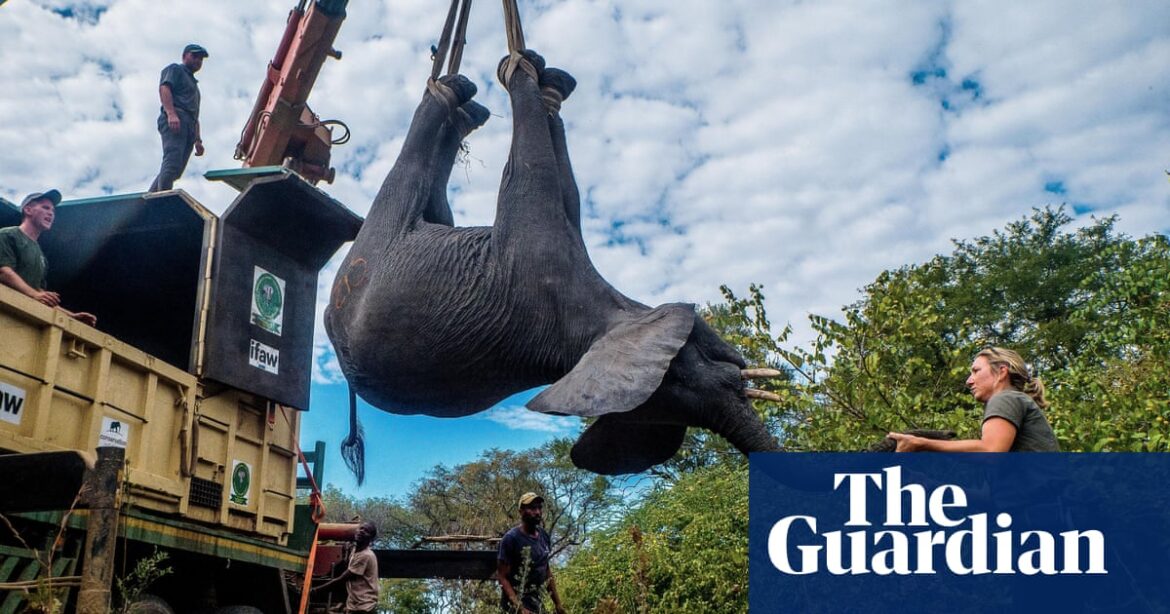
Unfortunately, four additional individuals lost their lives following the relocation of elephants, which was carried out by two wildlife groups. One of these organizations was led by Prince Harry and the translocation took place in a protected region in Malawi. These new fatalities bring the total number of deaths related to the transferred elephants up to seven.
In July of 2022, over 250 elephants were transferred from Liwonde National Park in southern Malawi to Kasungu, the country’s second-largest protected area. This operation involved collaboration between Malawi’s National Park Service and two non-governmental organizations – the International Fund for Animal Welfare (Ifaw) and African Parks. Prince Harry previously served as the President of African Parks for six years before being appointed to the Board of Directors in 2023.
According to conservation groups, the transportation of 263 elephants was one of the largest efforts ever undertaken. The groups utilized photographs and videos of the process to raise funds, with the footage of the elephants being lifted by crane likened to scenes from the Disney movie Dumbo.
Following the relocation, there were reports of two human fatalities caused by elephants in the new area, and another individual was killed in September of the same year. Local communities raised concerns about the increasing issue of human-wildlife conflict due to the African mammals frequently damaging crops.
Following the relocation, a member of the community made accusations against wildlife non-governmental organizations for prioritizing animals over people. The individual claimed that an electric fence intended to safeguard those living on the border of the park had not been fully constructed, pointing out that the elephants were relocated from an area that already had a fence in place. However, Ifaw and the Malawian national park service assert that this was a requirement for the translocation. African Parks refuted claims that the relocation of the elephants was hastily conducted.
Unfortunately, four more individuals have lost their lives to elephant attacks in Kasungu, bringing the total number of fatalities to seven. The fence in certain parts of the area remains unfinished. As a result, numerous children have become orphans and several families are facing financial struggles, according to sources at the Guardian. Ifaw has continued to collect donations by publicizing the 2023 elephant relocation. The NGO claims that its Room to Roam campaign, which aims to safeguard elephants, can help address the issues of biodiversity loss and climate change.
In June 2023, a woman named Masiye Phiri, who was 31 years old, lost her life and her two-year-old child was injured when they were charged by a male elephant while in a garden on the Malawian side of the park. This incident occurred after a group had left the designated boundaries of the park. In August 2023, Jackson Banda was also killed by an elephant after it had escaped from the park along with several others. The following month, Boniface Nkhoma was attacked at night by elephants while walking on a road outside of the park boundaries.
According to local sources, a 65-year-old man named Andrew Phiri was killed by a bull elephant in September 2023 on the Zambian side. The Guardian has been informed that there was a fifth death, but the details could not be verified. Ifaw has acknowledged that seven deaths have occurred since the elephants were relocated.
Chair of a group of villages near Kasungu National Park in Malawi, Malidadi Langa expressed approval of the relocation of elephants as it would benefit tourism. He also suggested the establishment of an insurance program to provide compensation for families impacted by the conflict between elephants and humans. Langa emphasized that this issue particularly affects impoverished and marginalized families.
Langa stated that while looking back, there is a desire for things to have been handled differently in order to avoid and lessen the harm caused by the relocation in terms of conflicts between elephants and humans. However, the main priority now is to concentrate on finding resolutions.
“Although good progress is being made on construction of the electric fence around Kasungu national park, such fencing needs to be embedded in policy and legal frameworks as a requirement, given that Malawi’s protected areas are bounded by dense human settlements.
“We advocate for the implementation of a human-wildlife conflict insurance plan to compensate those who have suffered losses. This comes from our past experiences with translocation and the acknowledgement that human-wildlife conflict only worsens existing inequalities, particularly for impoverished and marginalized communities residing in remote areas near the park,” he stated.
Ifaw expressed its sorrow for every incident of harm or loss caused by elephants who have wandered away from Kasungu. The organization collaborates with the governments of Malawi and Zambia to address conflicts between humans and wildlife, and has also been offering assistance to local communities. As of now, 57 miles of fencing around the park have been finished, with an additional 25 miles expected to be completed by 2024.
“Ifaw operates within the policy and legal framework of the governments of Malawi and Zambia. It is the government’s responsibility to deal with compensation in such matters, although there exists no such legal provision within the law of the two governments. Ifaw is bound to follow protocol in the management of these areas. However, Ifaw works with the governments to support the families tragically affected by human-elephant conflict by providing logistical and financial support – such as food, transport and coffins for the funerals of the deceased,” it said.
The national park service of Malawi reported a significant decrease in conflict between humans and wildlife in regions where a fence was constructed. They also stated that they have hired additional staff to protect the community from elephants that may cause harm, and refuted claims that the first relocation was carried out without regard for the safety and well-being of local communities.
African Parks, which no longer participated in the translocation in 2022, did not make a public statement. They had previously issued a detailed response to media reports. The prince was not a part of the translocation project with African Parks.
The national park service of Zambia did not reply.
Find more age of extinction coverage here, and follow biodiversity reporters Phoebe Weston and Patrick Greenfield on X for all the latest news and features
Source: theguardian.com



